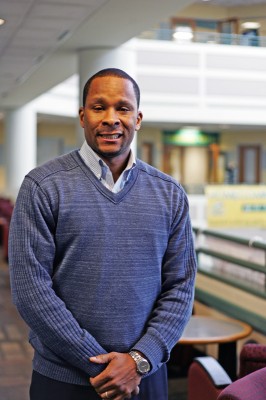
How long have you worked with George Mason University?
MH: I’ve been with Mason for a little over six years now.
How has your experience at Mason helped shape your views and teaching methods in the field of multicultural and diversity education?
MH: Well, there are two things that automatically come to mind. One is I’m reminded on a regular basis to never take anything for granted, to never assume that our students are willing or desiring to be educated around difference at first. Not all students find that information to be as valuable as I do. So I am reminded through what we call cultural conflict or intercultural crashes or bumps in the road of life that there is a need for education and consciousness around difference. Conversely, I am also reminded that there are people, individuals and groups, who are actively seeking information and consciousness around these issues and so one can never assume that the classroom isn’t full of progressive, active leaders. I want to give credence to those students who take risks in the classroom and across campus to make sure that multiple voices are heard.
The Spirit of King Award is being presented to you as a reward for your work and commitment to the development of a multicultural campus community. Will it also act as motivation for future work?
MH: Certainly. You know, like many others, I don’t do work around multiculturalism and anti-racism and intercultural communication to be recognized, per say. But it is nice to be recognized every now and again. This award reminds me that people take notice of the energy and the efforts that persons like myself put into our work and so certainly it actually energizes me and contributes to my desire to want to do more.
How do you feel about being selected to receive the Spirit of King Award?
MH: I’m humbly honored in the sense that I know so many other people around the university who are so deserving. There are folks who do work like mine every day, people who are working to implement and support what we consider to be justice and equality and human rights on a daily basis. I am honored to be among them and to have been recognized this year with such a distinguished award.
The Office of Diversity Programs and Services has done tremendous amounts of work towards personalizing Black Heritage Month as a campus-wide event and to raise awareness and spread knowledge about diversity. What are your views on their efforts?
MH: I appreciate it. Just yesterday, I attended an event facilitated by Rebecca Walter regarding the vision of Dr. King and his dream and whether or not we are, as a society, truly working for and reaching that dream. I recall thinking to myself that this event didn’t have to happen. It’s because of people like Dr. Walter and others who decide that these opportunities need to be available to students, that we have the opportunity and indeed the privilege to learn about black history and American history, because it is [all] American history. It should not be resigned to just a race or particular group but we have these opportunities because of the efforts of ODPS and we shouldn’t take them lightly. Some universities around the nation do not offer these opportunities, therefore students may not have the chance to get in and learn about American history, which indeed becomes rural history in the way that we have here at what’s considered to be one of the most multiculturally diverse campuses in the nation.
Is there anyone you would like to thank or anything you would like to say to members of the Mason community?
MH: I value the efforts of all individuals and groups who work so hard to ensure a safer and healthier climate here at GMU. Our various stories reveal that the dream is not yet a reality for all. Social justice is not easy to achieve. Claiming voice and speaking out comes with a risk of losing certain privileges or being ostracized by a dominant ideology. For example, when Rev. King was alive he was not celebrated in the way that he is celebrated now. To the contrary, what King stood for, his dream, was resisted in many ways. So I am reminded that real progress takes real struggle. This is not a passive but an active struggle which is undertaken daily by many individuals and groups across Mason’s campus. To me, this is the spirit of King, to be celebrated by example.






Comments